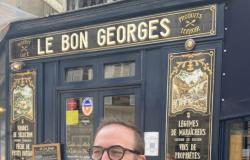Five years after the fire at Notre-Dame de Paris, 100% creation invites you to meet the companions, craftsmen or designers who worked on this emblematic construction site. Régis Mathieu, chandelier maker, is in charge of renovating the chandeliers at Notre-Dame de Paris. Master craftsman, his artistic vision and his quest for excellence have allowed him to collaborate with prestigious historical monuments, such as that of Notre-Dame de Paris.
The word chandelier, when I say it for the first time, people look at me strangely and say what this job is, even though everyone knows what a chandelier is!
Régis Mathieu, polisher
I give free rein to my artistic side which is very developed in me. It's very easy for me to create lighting fixtures. It's harder to know which one I'm really going to create or which one I'm going to keep in drawing or in my head. In this way, I create a counterpart to my collection of chandeliers which is personal to me in the choice and in the eye, if you like, but which also tells a story.
Régis Mathieu is originally from Marseille, his family is in the high-end, contemporary lighting business. He studied at a business school and at the same time learned the trade from the age of 20. After the death of his father, his mother took over the business. At the end of his business studies, it was his turn. He then repositioned the company so that the chandelier is a luxury object, at the crossroads of craftsmanship and contemporary aesthetics.
“It took me 10 years for me to feel competent. Afterwards, I acquired this know-how through restoration and passion. Unbridled passion. I buy models, the whole biography on this subject, meet people as passionate as me and very quickly become the specialist in chandeliers. It happened quickly because I had no competition. There was no one who was an expert on chandeliers. It's quite comfortable for me. That is to say, even if I don't know much about my subject, I always know more than the people I have in front of me, so I can bring them something. Not to be old-fashioned – at 25, it's nice to do dusty “old people's jobs” and remove cobwebs from chandeliers – but I have to be a little part of my time, it I have to exhibit at fairs and appear in newspapers of my time. I decided to create contemporary lighting. It's quite pretentious because it's the same hands that reissue the chandeliers of the masters who will create contemporary lighting fixtures. I pretend to say to myself : “What are we going to restore tomorrow when we talk about today?” I restore chandeliers from 1750, but what is the luster of 2000 for example? And I say to myself, since I can't find, since I don't see what it is, I'm going to create it. I therefore use know-how, noble materials and historical know-how to create today's forms. »
A commitment to safeguarding heritage
Régis Mathieu's commitment is profound to the preservation of heritage, with public projects such as that of Notre-Dame de Paris. “We went to get the chandeliers. We cleaned them up because they were full of lead, because the ceiling had obviously melted inside. A decontamination work with standards that I did not know. For the little anecdote, my daughter, Inès, joined the company with us, and responding to the call for tenders from Notre-Dame, it was her baptism of fire, she got it, it was a sign that it must continue! I had never done lead dusting as heavy as that of Notre-Dame, where you had to be in a diver with the air that was treated and do work in order to be able to take the chandeliers to the workshop, etc. Well, it was Inès, my daughter, who took care of it. She told me : “C'was a beautiful memory.' I'm glad she told me that because it was physical. »
“Afterwards, we took the chandeliers to the chandeliers, with an inventory, analyses, x-rays, to find out if it was gold, not gold, what was the composition of the varnishes. We did surveys. All the classic work of all restorers. We come to the analysis that the chandeliers were varnished with a more chrome yellow shellac which makes it a very specific color of yellow. Viollet-le-Duc wanted stars in the sky, the chandeliers therefore have a star color rather than a gold color. Once we did that, the restoration of the parts began. »
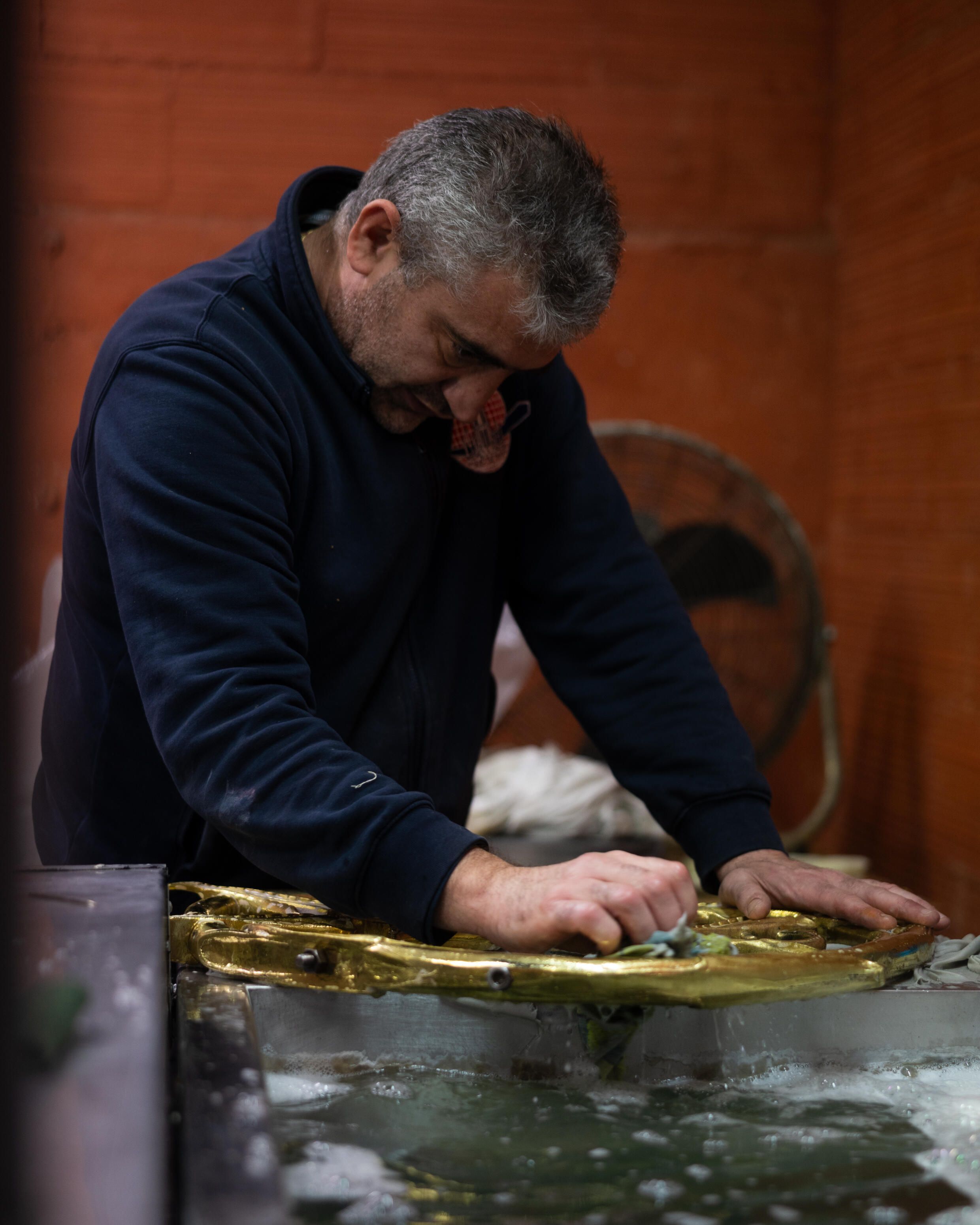
It is Notre-Dame who chooses how the chandeliers should return to the cathedral
“Before, we didn't know what we could do to them, if we could hit them with a hammer, heat them, etc. We restore the parts that were the most damaged. And there, miraculously, as usual, it's Notre-Dame, the chandeliers which were the most damaged, the most twisted and the most crushed, we heat them, they are put on templates and they come back, take shape again, as if they had decided to return to the cathedral. »
For Régis Mathieu, each restored chandelier is suitable for the Gothic cathedral today. “ Once we had cleaned everything, there were traces of yellow, traces of brown, black. It was uniform and quite elegant. We said to ourselves : “Why not keep the chandeliers with the patina of time? It's their story. They'll tell us a little about the fire.” We did a test by restoring a chandelier, we cleaned it as much as possible. We put candles, take it to the cathedral to do a test there. It lasted 10 seconds. The chandelier, the cathedral rejected it, it really wasn't beautiful, it wasn't a good idea. »
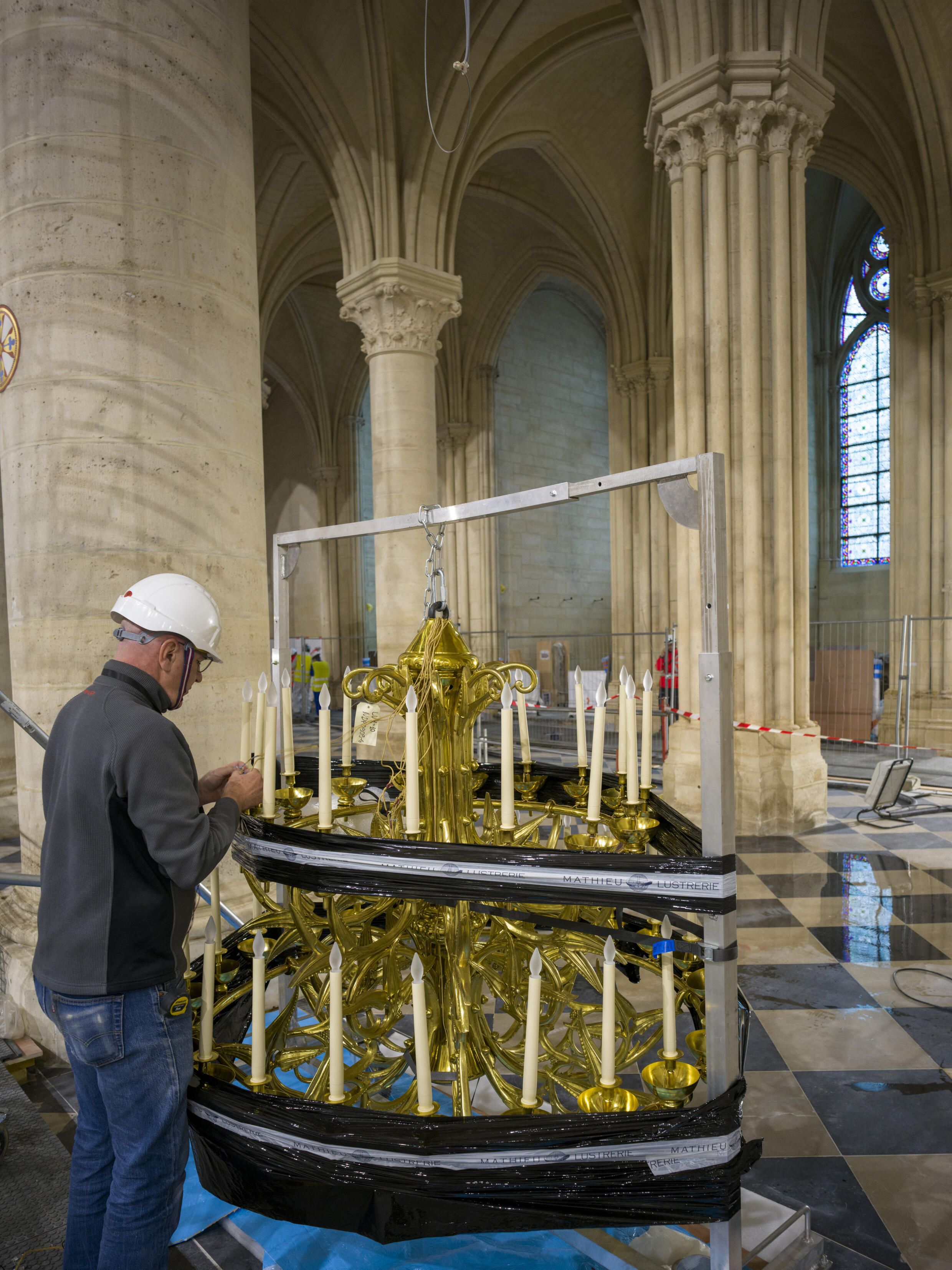
“At that time, one of the chandeliers, which is the most damaged, we rebuilt it and we did a new test in the same place, without patina, without the ravages of time, without what the other chandeliers obviously had, even if they were in good condition. Lack of varnish, black marks and everything, but which gave a certain charm. But the cathedral is too white, it is too perfect. It has taken on a facelift and therefore the chandeliers must play in unison. We made a brand new chandelier that we found almost flashy in terms of chandeliers. But that's it, it was the work of Viollet-le-Duc, it's burnished, it's shiny, there are parts which are deliberately flashy, and that was the architect's wish. And then on top of it sheets which are more matte to create volumes. We are taking this chandelier to the cathedral. We then have the opposite effect. We stayed for an hour watching it! It's going really well. »
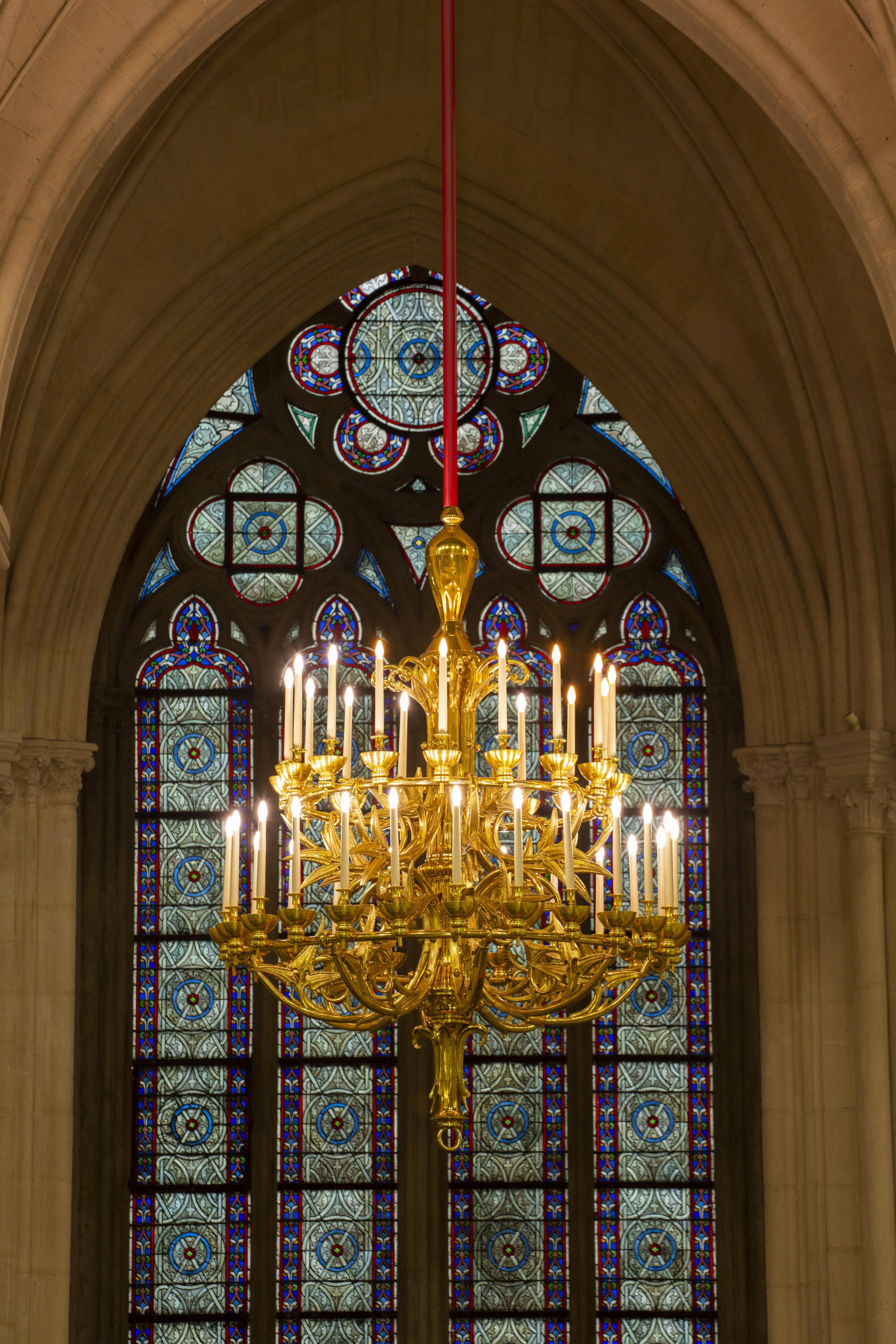
For Régis Mathieu, there is no longer a hierarchy when you work for Notre-Dame de Paris. « I've never had a project like this, I even get emotional talking about it, something very different is happening. You feel like you're doing something useful for someone you don't know. To God, to the town hall, to the cathedral itself, for the faithful, of which I am one, but in connection with the cathedral itself. The cathedral agreed not to be destroyed, it chose us to do this. We are all on the same team. It's quite funny. For my companions and myself, this could be a basic project, especially for me, because this is the third time that I have really worked on Notre-Dame de Paris. I have restored candelabras and worked at Notre-Dame many times in my career. »
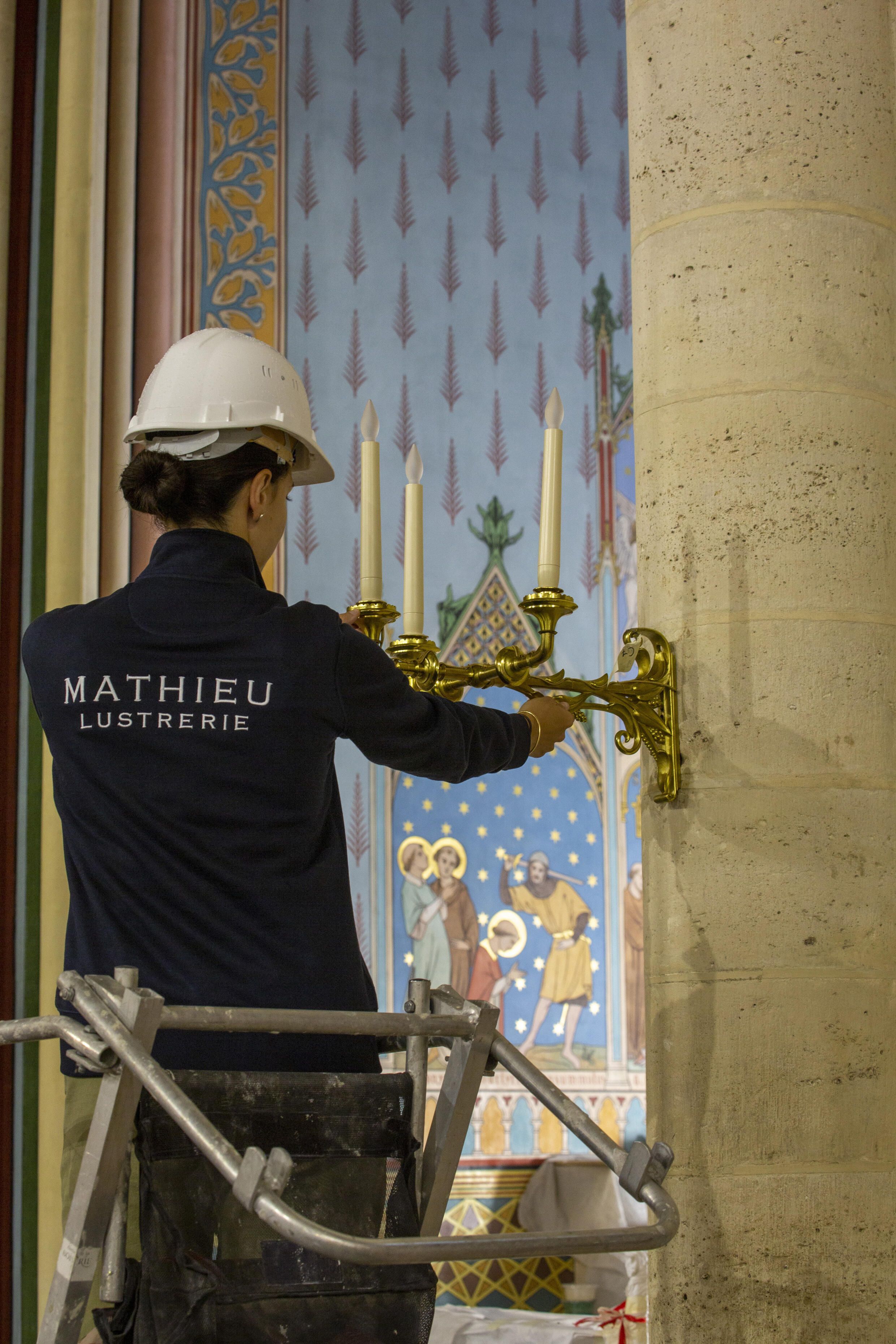
“Notre-Dame, our pretty Victor Hugo cathedral, a little grimy, all black, a little dirty all the same. Every time I went in, I wondered when they were going to restore it. And the fire is like 9/11. We remember this very special moment when the Paris Cathedral went up in spectacular flames with the spire falling. When you're restoring these objects, something different happens. »
The reconstruction of Notre-Dame de Paris would not have been possible without the artistic professions and their know-how and for Régis Mathieu, it is a unique project in his career. “We realized that without the crafts, without this know-how, these corporations, we would perhaps not have been able to reproduce Notre-Dame. And there would be a 5-story parking lot today at Place de Notre-Dame. Thanks to everyone who worked on this. We feel it for others and we receive it for ourselves. All this wonderful team working on this site because all the trades, the architect, the DRAC [la Direction régionale des affaires culturelles]everyone is passionate. Our architect of historic monuments, he experiences this restoration project in a very special way. I've never seen this! This site is very different. »
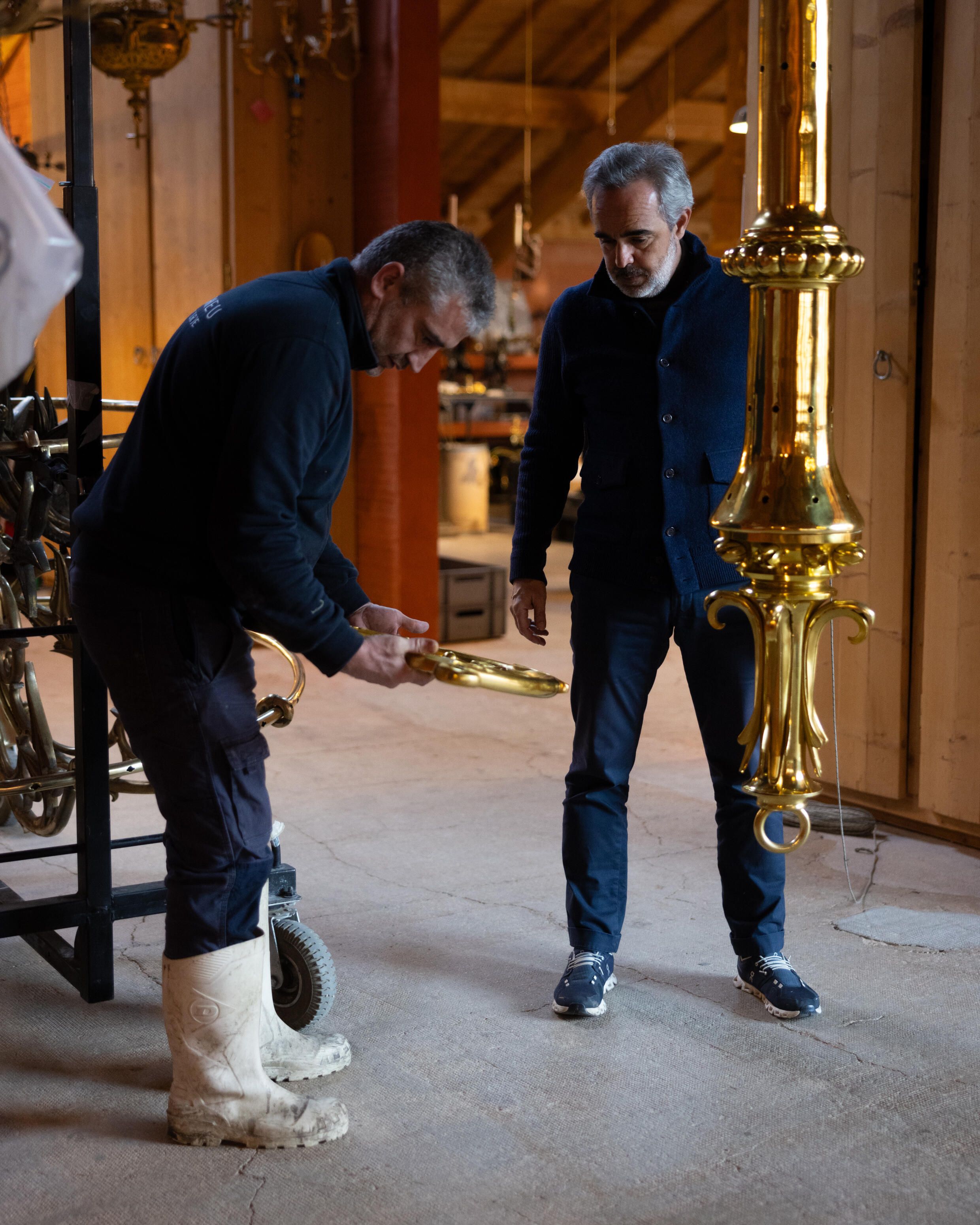
“At the chandeliers, no one blew to do anything on the Notre-Dame chandeliers. It was difficult, heavy, dirty, complicated because the chandeliers were destroyed, very damaged, almost melted, they had fallen and caught the nave on top. A chandelier was redone later. He wasn't the same as the others. It was varnish, so imagine with the flames. The varnishes have really disappeared. The electrification, the new lighting of the cathedral, all the standard, daily work of our profession, but for Notre-Dame, everything was very different. I think that in the arts and crafts, there will be a before and after Notre-Dame. »
Find all the episodes of 100% Création on:
Apple Podcast Castbox Deezer Google Podcast Podcast Addict Spotifyor any other platform via the RSS feed.
Also readIonna Vautrin, the designer chosen for the chairs of Notre-Dame de Paris [3/9]

![Régis Mathieu, a master luster maker at Notre-Dame de Paris [4/9]](https://euro.dayfr.com/temp/resized/medium_2024-12-21-3d18a0e9c0.jpg)
![Régis Mathieu, a master luster maker at Notre-Dame de Paris [4/9]](https://euro.dayfr.com/temp/resized/medium_2024-12-21-11be4a476d.jpg)
![Régis Mathieu, a master luster maker at Notre-Dame de Paris [4/9]](https://euro.dayfr.com/temp/resized/medium_2024-12-21-047f093ca1.jpg)
![Régis Mathieu, a master luster maker at Notre-Dame de Paris [4/9]](https://euro.dayfr.com/temp/resized/medium_2024-12-21-da3f678704.jpg)
![Régis Mathieu, a master luster maker at Notre-Dame de Paris [4/9]](https://euro.dayfr.com/temp/resized/medium_2024-12-21-62db536e60.jpg)
![Régis Mathieu, a master luster maker at Notre-Dame de Paris [4/9]](https://euro.dayfr.com/temp/resized/medium_2024-12-21-4824940606.jpg)
![Régis Mathieu, a master luster maker at Notre-Dame de Paris [4/9]](https://euro.dayfr.com/temp/resized/medium_2024-12-21-a08876ef64.jpg)



